
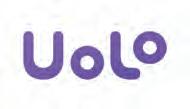
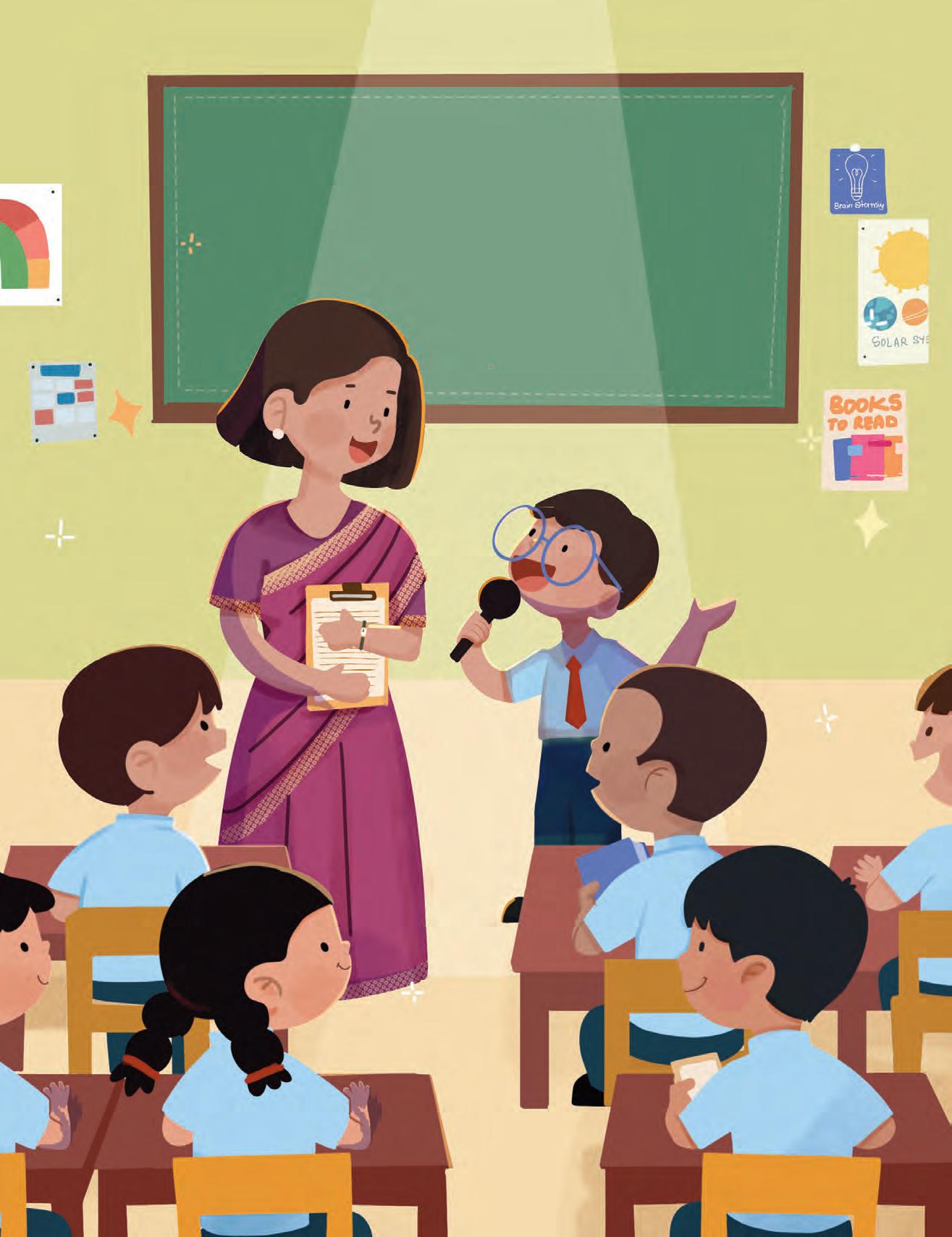
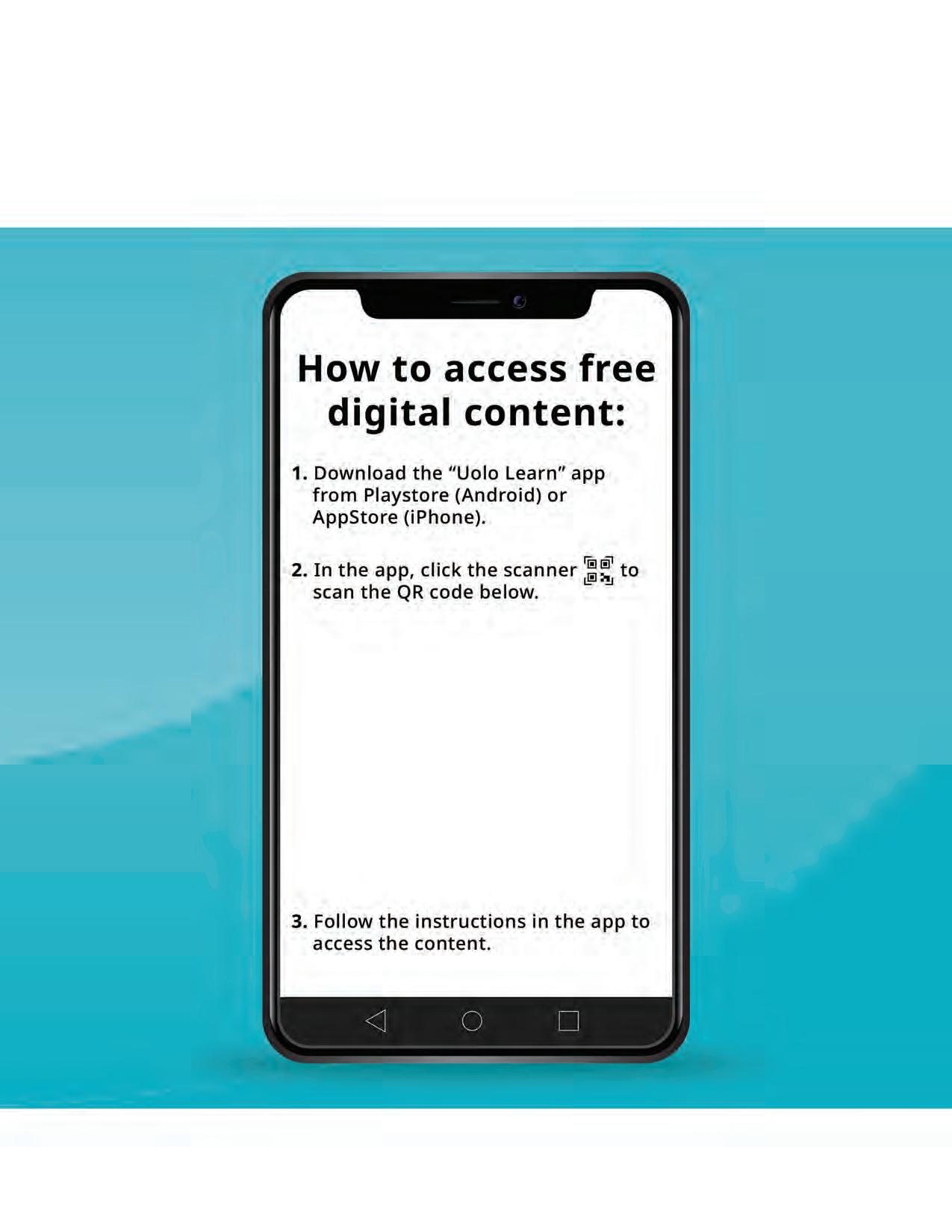
Get access to animated learning videos, interactive quizzes, projects and more — all on the Uolo Learn app!





Get access to animated learning videos, interactive quizzes, projects and more — all on the Uolo Learn app!
Achieve Fluency in Verbal Communication

Academic Authors: Kashika Parnami, Sneha Sharma, Simran Singh, Arpit Agarwal, Laraine O’Connell
Creative Directors: Bhavna Tripathi, Mangal Singh Rana, Satish
Book Production: Rakesh Kumar Singh, Tauheed Danish
Project Lead: Chandani Goyal
VP, Learning: Abhishek Bhatnagar
All products and brand names used in this book are trademarks, registered trademarks or trade names of their respective owners.
© Uolo EdTech Private Limited
First edition 2026
This book is sold subject to the condition that it shall not by way of trade or otherwise, be lent, resold, hired out, or otherwise circulated without the publisher’s prior written consent in any form of binding or cover other than that in which it is published and without a similar condition including this condition being imposed on the subsequent purchaser and without limiting the rights under copyright reserved above, no part of this publication may be reproduced, stored in or introduced into a retrieval system, or transmitted in any form or by any means, electronic, mechanical, photocopying, recording or otherwise, without the prior written permission of both the copyright owner and the above-mentioned publisher of this book.
Book Title: Speak 2.0 5
ISBN: 978-93-89057-80-5
Published by Uolo EdTech Private Limited
Corporate Office Address:
91Springboard, 3rd Floor
145, Sector 44, Gurugram, Haryana 122003
CIN: U74999DL2017PTC322986
Printed by: Kumar Offset Printer
Illustrations and images: www.shutterstock.com, www.stock.adobe.com and www.freepik.com
All suggested use of the internet should be under adult supervision.
In the age of globalisation and unprecedented technological advancement, English stands as a universally comprehensible medium of communication. It has evolved into one of the essential tools that learners require to thrive in today’s world and secure their future. Studies from across the globe show that English communication skills significantly impact on career prospects and lifelong learning.
Functional and fluent communication skills in English, encompassing the crucial facets of LSRW (Listening, Speaking, Reading and Writing), are pivotal to children’s knowledge acquisition, intellectual, socio-emotional development and lifelong learning.
In particular, robust listening and speaking skills not only form the bedrock of the language learning process but also pave the way for enhanced reading and writing capabilities. Yet, the majority of educational efforts prioritise teaching reading and writing from the very outset, sometimes neglecting listening and speaking skills. These foundational skills are often overlooked in educational institutions due to high pupil-teacher ratios, lack of opportunities to express themselves in English, and most significantly, a lack of structured and dedicated class time for honing these skills.
It is within this context that Uolo Speak 2.0 has been introduced as a groundbreaking English program tailored for learners in pre-primary to grade 8, with a special emphasis on English listening and speaking. In alignment with the National Education Policy (NEP) of 2020 and the learning outcomes set forth by the National Council of Educational Research and Training (NCERT), the books comprise 12 chapters on essential functional skills, with the last three advantage chapters to be used at the teacher’s discretion, depending on learners’ readiness.
The Speak 2.0 book serves as the classroom-based avenue for developing functional speaking skills. The book contains teacher-led English speaking and listening activities that adhere to the highly recommended and research-based teaching-learning method known as the Gradual Release of Responsibility (GRR). This approach systematically guides learners to master the targeted competencies. Through these activities, learners engage in high-quality, age-appropriate and experiential tasks that foster confidence and fluency in English. The accompanying Teacher Manual provides in-depth implementation plans for these activities.
AI lies at the heart of Speak 2.0, powering digital experiences that make learning English speaking dynamic and personalised. The package comes with digital content, provided free of cost, to ensure a seamless and holistic learning experience for children.
The mobile interface ensures consistent practice of functional English skills, while learners participate in speaking tasks enriched with AI-based evaluation and real-time feedback. Acting as a smart companion, AI guides pronunciation, sharpens usage, and enhances accuracy, encouraging learners to practise with confidence. With this seamless blend of AI-driven practice and feedback, learners steadily build fluency and gain the confidence to express themselves effectively in everyday communication.
Uolo Speak 2.0 offers a potent, captivating and unique learning experience for learners. It embodies a pragmatic, results-oriented approach to cultivating indispensable functional English skills required for the 21st century. We extend our warmest wishes to all educators, parents and learners as they embark on this exciting journey with Uolo Speak 2.0, filled with fun and joyful experiences.

Dr Laraine O'Connell
D. Litt., English, North West University, South Africa
I am a veteran English teacher and lecturer, with a great love for English and for teaching. I have taught English and trained teachers over many years. I live in South Africa and it is a wonderful experience working with a company promoting the learning of English in India.
Welcome to the Speak 2.0 journey!
The program is a thoughtfully crafted activities-based learning experience that builds students’ speaking skills in English. The program, with dedicated time and space within the classroom, becomes a platform to practise speaking and listening skills in everyday scenarios. These scenarios are created by way of teacher-led activities, which cater to specific competencies in English.
Coursebook
Speak on the Spot Activities
Prepared-Speaking Activities
Teacher Manual
Student and Teacher Apps
Talking Books
Listening and Speaking Projects
Interactive Practice Quizzes
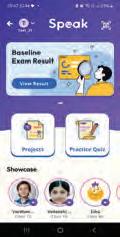
The classroom program is augmented by the digital world, which is presented to the students through the UOLO App. The app includes projects that are closely associated with the activities in the coursebook. The projects allow a fear-free practice time to children at home and are AI evaluated. The app also includes quizzes in listening, speaking, reading and writing that can be done at home.

The National Education Policy (NEP) 2020, introduced by the Government of India, represents a transformative shift in the country’s education system. It aims to create a more holistic, dynamic and multidisciplinary approach to education. NEP 2020 focusses on fostering conceptual understanding, skills, values and competencies that align with the demands of the 21st century, while also preserving India’s rich cultural heritage. UOLO is fully committed to actualising the vision of NEP 2020 by meticulously adhering to its outlined recommendations.



1. Comprehension and understanding
2. 21st-century skills, values and dispositions
CompetencyBased Education
3. Application in real life




4. Holistic and integrated learning
5. Enjoyable and engaging
6. Collaborative and exploratory activities
NEP Pages 12, 17, 22
Teaching and Learning Pedagogy
7. Technology-based solutions

NEP Pages 3, 11, 12, 27
8. Assessment of core concepts and application skills Assessment
NEP Pages 12, 18, 22
Exposure to rich literature, as stories and poems, that demonstrate essential speaking behaviours and competencies.
1 2 3 4 5
Build mastery in new words usage, and expression, while also strengthening phonics skills to lay a strong foundation for reading and pronunciation.
1 2 7
Enhanced listening comprehension and elevated English learning experience through animations that bring each text to life.
1 5 7

Digital projects and supportive platforms that present English speaking opportunities in a fear-free environment.
2 3 4 5 7 8
Classroom activities and presentations that help build confident expression and language usage in everyday scenarios.
2 3 4 5 6 8
1 Comprehension and understanding
2 21st-century skills, values and dispositions
3 Application in real life
4 Holistic and integrated learning
5 Enjoyable and engaging
6 Collaborative and exploratory activities
7 Technology-based solutions
8 Assessment of core concepts and application skills

‘In the 21st century, language teaching must go beyond traditional approaches and must aim to enable students to use language skills in real-life contexts for a wide variety of purposes.’ (NEP, 2020)
According to Vygotsky and Krashen’s theory of second language teaching, language acquisition happens best when learners are engaged in purposeful and meaningful tasks in an anxiety-free, non-judgemental, communication-oriented, input-rich, supportive and stress-free environment, along with a lot of scaffolded practice. This approach to second language teaching is also highlighted by the NIPUN Bharat Mission document and NEP 2020.
In this context, the Speak 2.0 series, along with the learning activities designed in it, can play a crucial role in creating an input-rich environment, employing diverse avenues for speaking practice in a fear-free and non-judgemental setting, coupled with real-time feedback.
The book has been developed based on the ‘Gradual Release of Responsibility’ (GRR) model— a teaching-and-learning model that has been widely recommended by the NEP 2020 and the NCF 2022-23. The GRR has been promoted by educational researchers and practitioners all over the world for its effectiveness in promoting student engagement and a deep understanding of content and skills.
The GRR model includes three steps, each one consecutively shifting the ‘responsibility’ from teachers to learners so that learners become independent users of the language.
I do: The teacher first provides explicit instructions and modelling that initiate the learning process.
We Do: As learners begin to grasp the content and skills, the teacher also begins to shift the responsibility to them, facilitating guided practice where the teacher and the learners participate collaboratively.
You Do: Finally, the learners take full ownership of their learning through independent practice and the application of the skills learnt in the program.
Based on this approach, there are three core instructional models on which the activities work (please refer to lesson plans in the Teachers' Manual for greater clarity). These are:
I do We do You do Listen Echo Express and Repeat (E&R)
Fully guided; Modelled speaking by the teacher
Collaborative; Shared speaking between the learners and the teacher Independent practice and application by the learners
To sum up, the programme has been created to do away with the fear of speaking in English among learners and allowing them to express themselves confidently in English in real-life situations.
The National Curriculum Framework for Foundational Stage (NCF) , released in 2023, is developed based on the vision of the National Education Policy (NEP) 2020, and to enable its implementation. The NCF provides guidelines for designing school syllabi and textbooks in India. It aims to improve the quality of education by making it more relevant, engaging, inclusive, and learner-centric. To achieve this, the NCF has articulated precise Learning Standards through well-defined Curricular Goals and Competency statements. These statements serve to harmonise the syllabus, content, pedagogical practices, and assessment culture, ensuring a cohesive and comprehensive educational experience. Curricular Goals: Curricular Goals are statements that give direction to curriculum development and implementation. They are derived from Aims and are specific to a Stage in Education.
Competencies: Competencies are learning achievements that are observable and can be assessed systematically. These Competencies are derived from the Curricular Goals and are expected to be attained by the end of a Stage.












C-1.1 Converses fluently and meaningfully in different contexts
CG-1 Students develop oral language skills using complex sentence structures to understand and communicate abstract ideas.












C-1.2 Describes an outline of the material that has been read out and answers questions related to it












C-1.3 Summarises core ideas from the material that was read out



















C-1.4 Demonstrates the ability to speak their reasoning coherently
C-1.5 Makes oral presentations (class debates, short welcome notes, anchoring of small events, short speech, and so on)















C-4.1 Uses knowledge of homophones, word roots, affixes, suffixes, synonyms, and antonyms
CG-4 Students acquire a more comprehensive range of words in various contexts (of home and school experience) and through different sources.

C-4.2 Discusses meanings of words and develops vocabulary by listening and reading a variety of texts or other content areas
1 Making a Request
2 Taking Part in Formal Conversations
3 Describing an Event
4 Giving Step-by-Step Instructions
5 Questions and Responses
6 Sharing Preferences
7 Giving Warnings or Advice
8 Raising a Complaint
9 Giving a Summary
Make a formal request using appropriate body language
Make an informal request in a polite manner
Express thoughts correctly during a formal conversation Use appropriate body language and polite expressions
Describe an event briefly and with a few key details
Answer simple questions about an event/incident
Give clear and step-by-step instructions
Understand the spatial directions given by someone
Participate in an interview to gain/share information
Ask closed-ended and open-ended questions
State their preferences clearly with simple reasons
Ask others about their preferences and respond politely to their preferences
Give short warnings or helpful advice
Respond to warnings or advice using simple and polite language
Raise a complaint giving simple details
Express one’s concerns in a polite yet firm manner
Identify key details of a text or an event
Give a short summary using key details 10
Stating Problems and Solutions
State a problem clearly in short sentences, giving simple details
Suggest simple solutions to a problem 11 Delivering an Announcement
Include the purpose, key details and closing in an announcement
Deliver the announcement in a formal setup 12 Presenting Informed Opinions
Present an informed opinion clearly Support opinions with relevant facts, information and logic


Talking Book: Animated video of the text
a Request
Chapter Text: Main text to demonstrate the targeted competency
Keywords: Keywords from the text with meaning and pronunciation

Talk Toolkit

Talk Toolkit: learners with essential vocabulary and language structures for the targeted speaking competency
E-Speak 1: A series of three guided speaking projects on the mobile app

Gaming Zone 1 and 2: Fun activities aligned with the big skill








Speak on the Spot: Impromptu speaking activity to be done in the classroom
E-Speak 2: A short, open-ended, assessment-type project on the mobile app
Speaking prompts with no expectation of writing






Practise: Guidance on how to practise at home
Tips: Helpful points for better speaking








A classroom presentation to be made after thorough planning and preparation

Reflection Journal: A template for reflecting on the achievement of the targeted outcome





Could you please help me pick up the groceries?
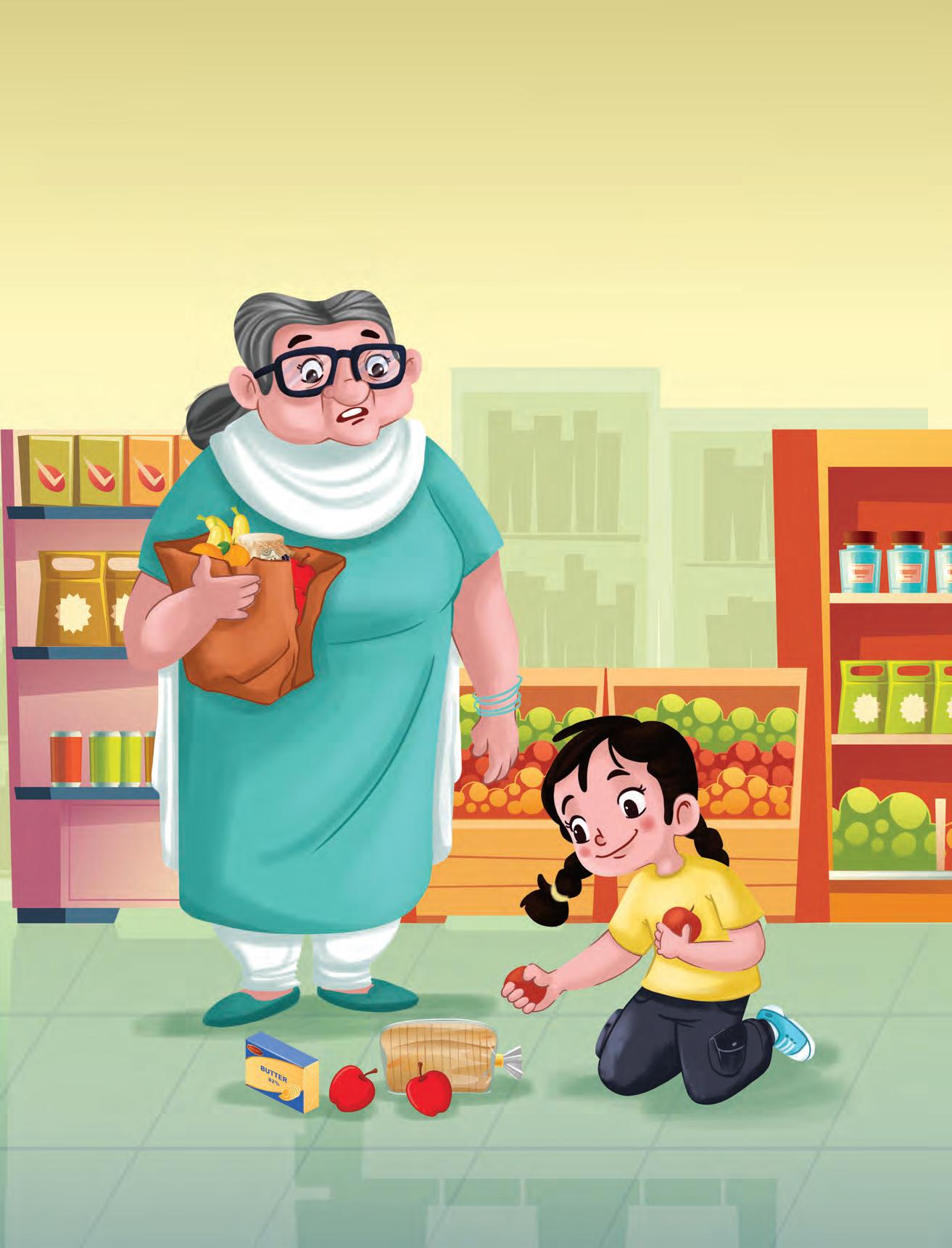
Yes, sure!


Sir, could you please take action regarding the potholes in the street?
Dad, please give me some cookies to eat.
Ma’am, could you please explain this topic again?
Can you please pass me the TV remote?
Mom, can I go and play in the park with my friends?











In this chapter, I learnt to . New words I learnt:
Request your class teacher to allow extra games time during the last period on Friday. Write your polite request and give a reason in 3–4 sentences.
How confident do you feel about making polite requests?
I need help.
I think I can do it. 3 I feel confident.






Good morning, sir. I have come to return this book.
Thank you! I hope you enjoyed reading it. Would you like to borrow another one?










In this chapter, I learnt to . New words I learnt:
Imagine you are attending a workshop about the environment. Write two questions you can ask the volunteer and two suggestions you can give to save the environment.
How confident do I feel when I share my thoughts and ideas in formal situations? 1 I need help. 2 I think I can do it. 3 I feel confident.



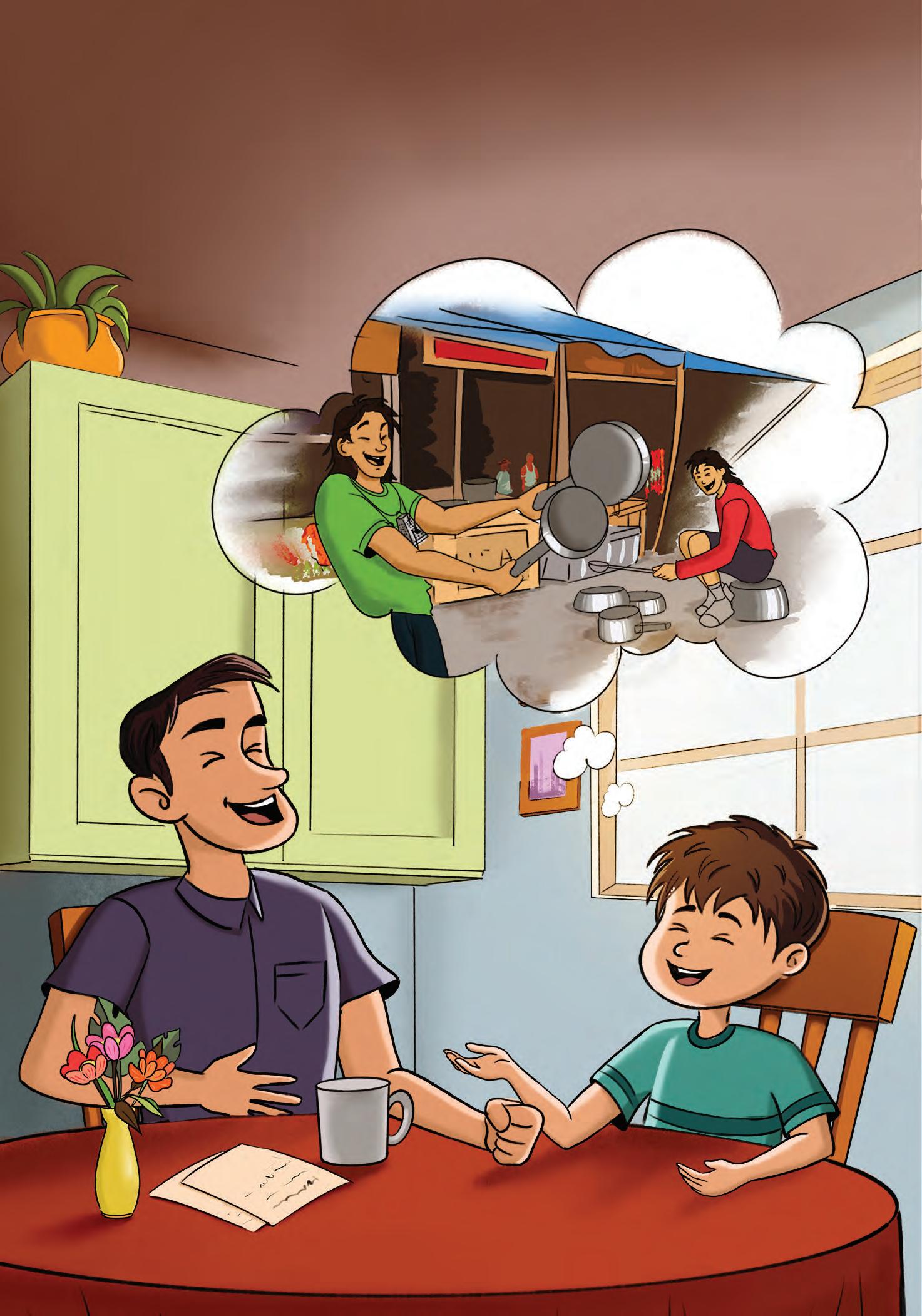
Let me tell you what happened in the kitchen that day.
That sounds so funny!



Talk Toolkit
The event was The event was held on 20 December in the school auditorium./ held on... The event was held on Saturday afternoon at Sunrise Park. It all began... It all began with a welcome speech delivered by our Principal./ It all began with the school choir singing the welcome song. The audience/guest… The guest at the event told the children inspirational stories./ The audience cheered loudly after the performance.
One of the highlights… One of the highlights was the tug-of-war near the food stalls./ One of the highlights was the magic show.
The event was… The event was colourful and well organised./ The event was lively and full of laughter. It was truly a… It was truly a fun evening with friends./ It was truly a memorable day for everyone.
The day ended… The day ended with a thank-you speech and a group photo./ The day ended with music, dancing and happy faces.




Today, I want to talk about . (the event you chose)
The opening ceremony took place on (day/date) at (place).
The guest of honour was .
The event began with . (something special)
The audience . clapped laughed cheered danced
One of the highlights was . (any fun activity, performance or surprise)


The event was . memorable mesmerising fun exciting lively surprising (name of a famous personality)







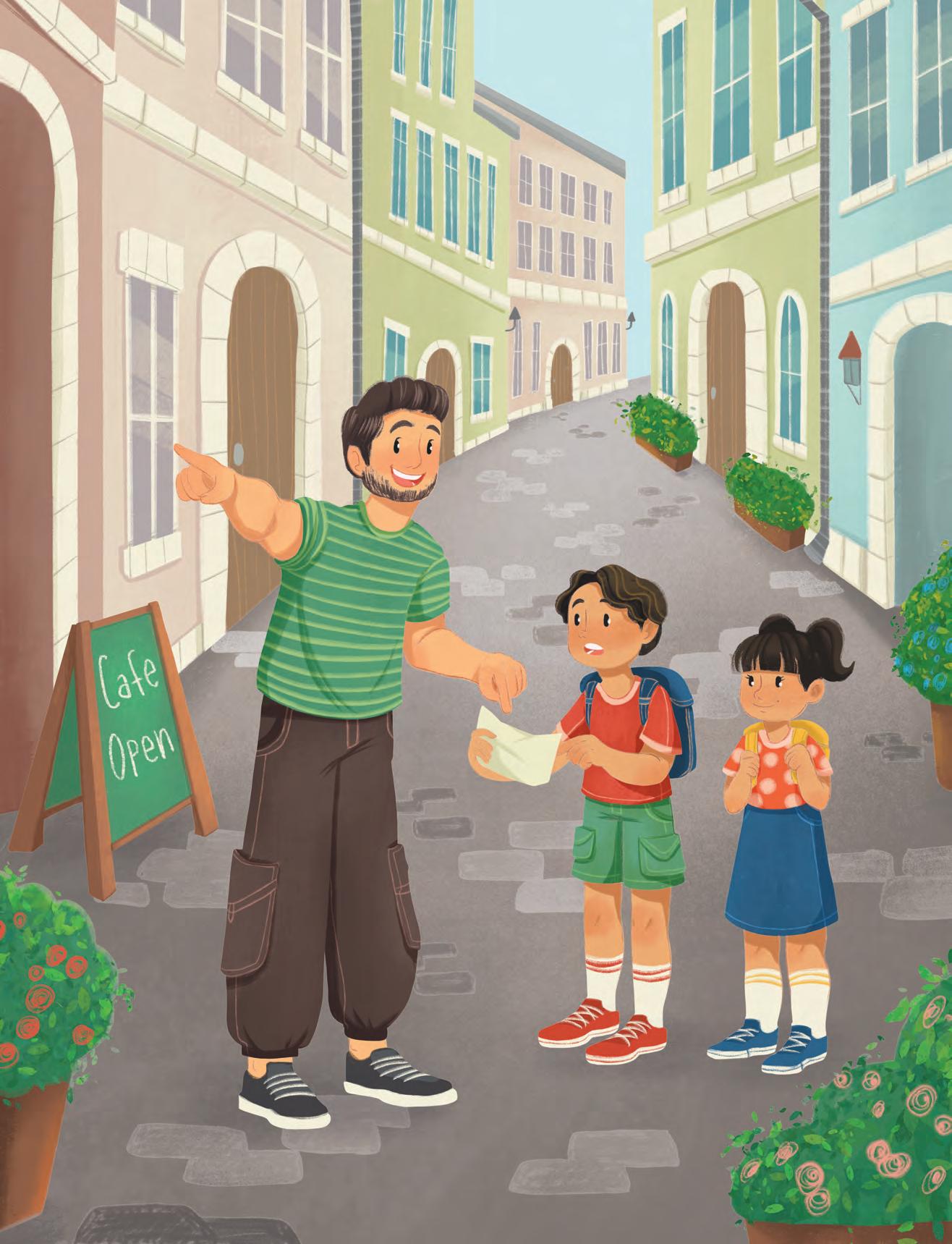
Could you please direct us to the bus stop?
Sure. First, take a left. Then, turn right.













What motivates you to pursue your goals and dreams?
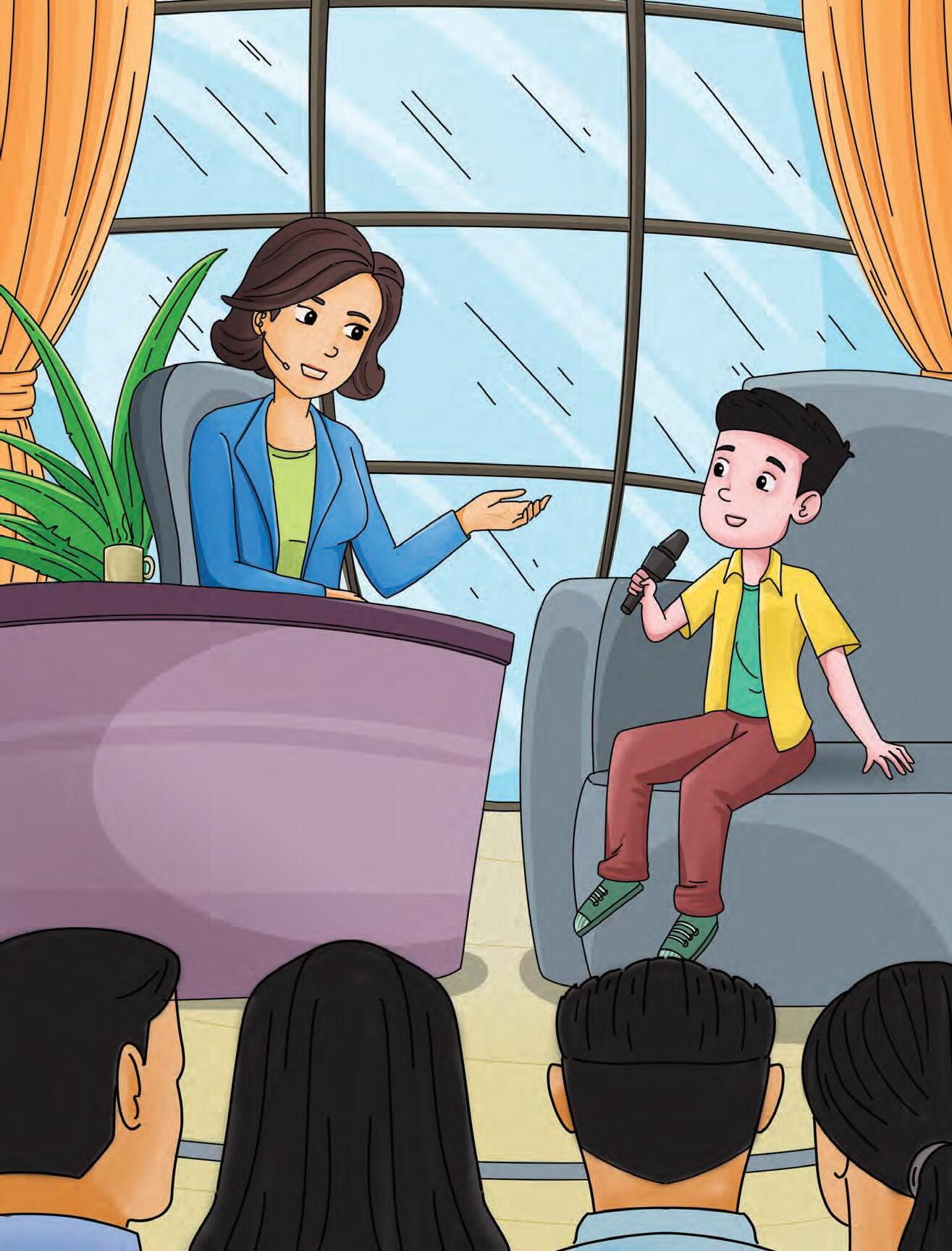
I am motivated by learning new things and trying new challenges.








The best part is . Thank you, I really enjoyed learning more about you.
I watched/ate it with . What do you like the most about ? Me too. Have a nice day.
2
Practise: Practise the dialogue with your partner in your free time.
3
Present: Say your lines in front of the class.



Look at your partner while speaking. You can give your own answers. Smile and speak politely.
In this chapter, I learnt to . New words I learnt:

Imagine your favourite sportsperson is visiting your school as the chief guest. Write 4–5 questions you would like to ask them.
How confident do I feel asking and answering questions?
I need help.
I think I can do it.
I feel confident.




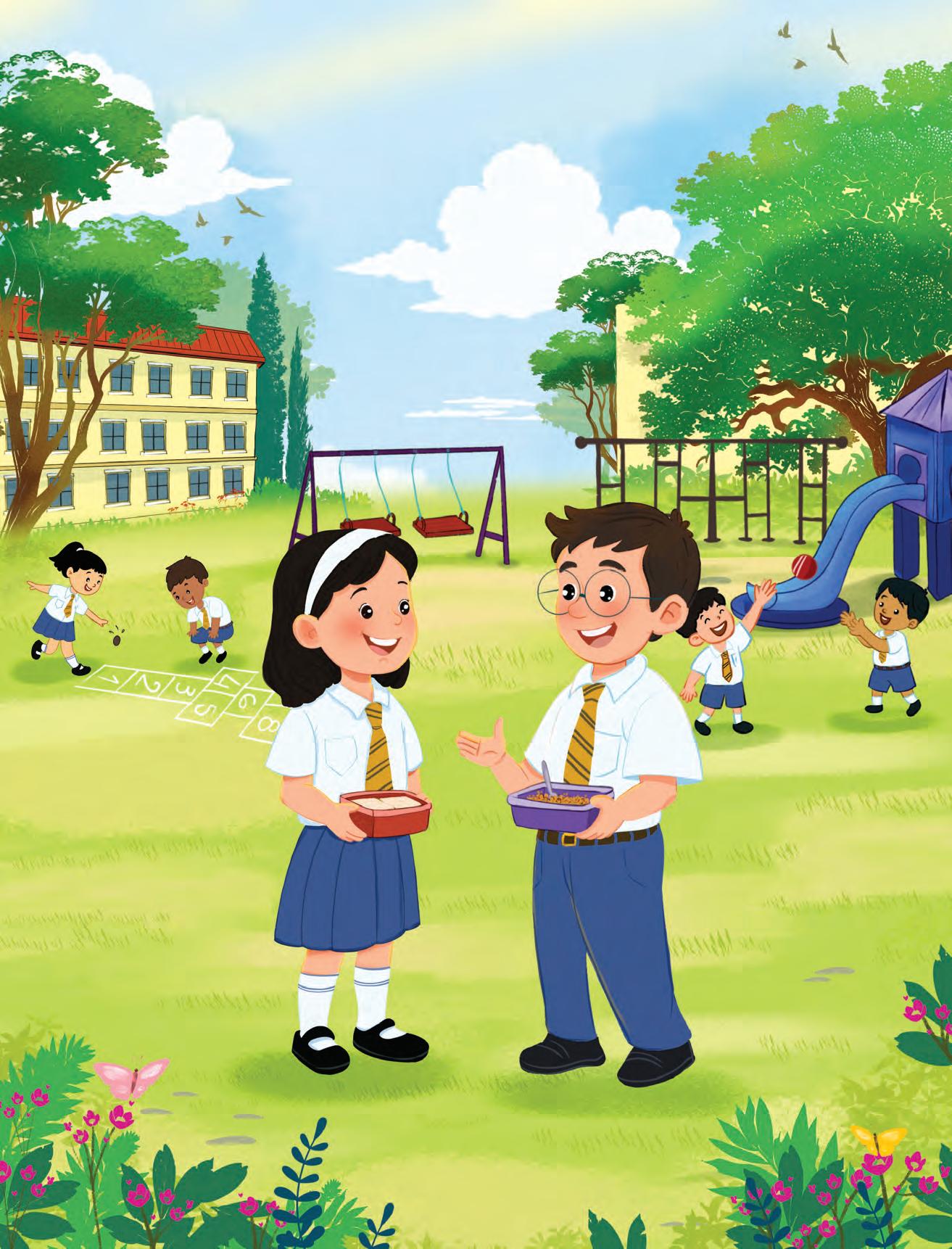
I like watching Doraemon. It’s fun! What about you?
I like Chhota Bheem more. It makes me laugh!










In this chapter, I learnt to . New words I learnt:
Do you prefer joining the basketball team or the art club? Write about your preference in 4–5 lines.
How confident do I feel while stating my preferences clearly and responding to others’ preferences?
I need help.
I think I can do it.
I feel confident.



You should wear your cap, dear. It is very hot.
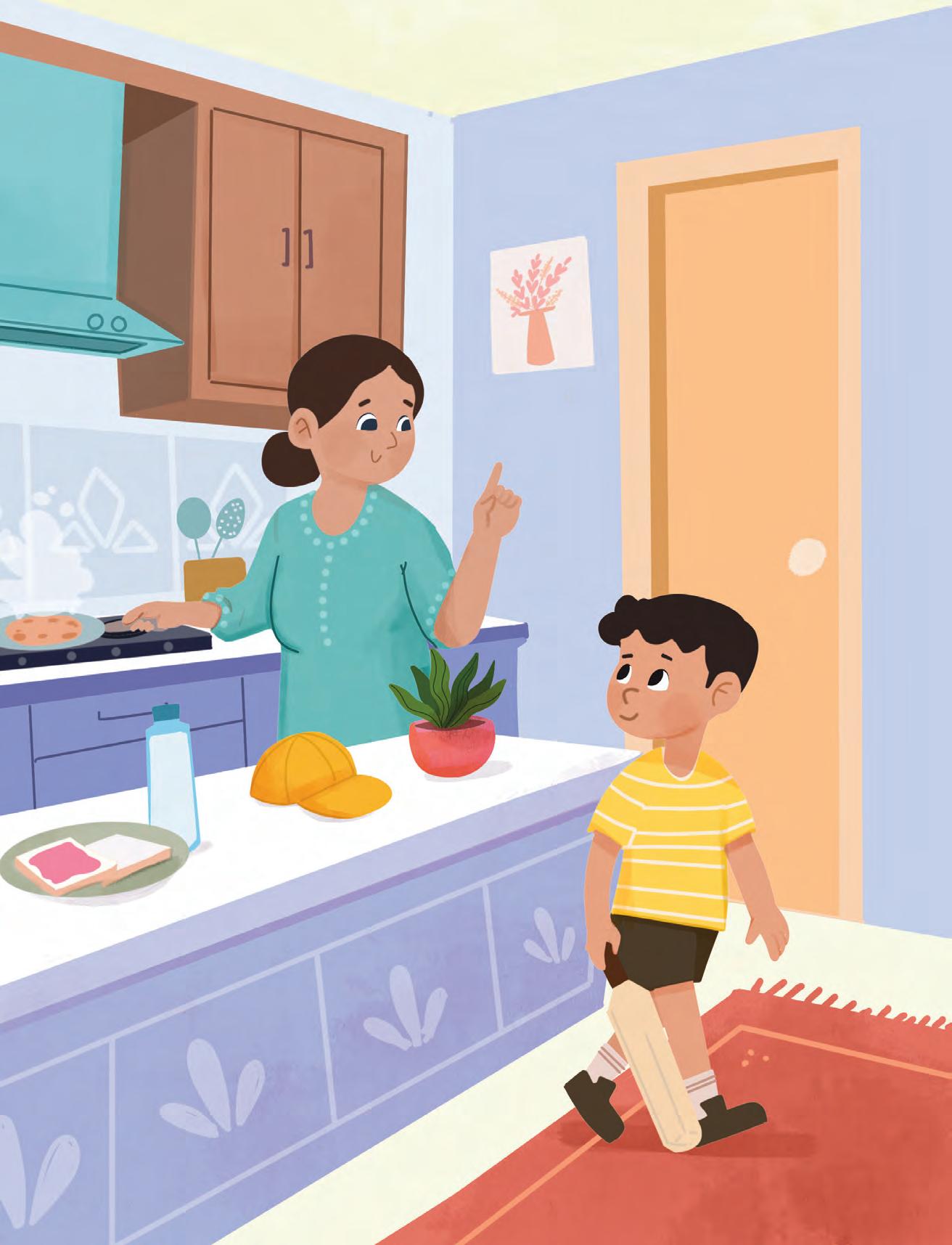
Okay, Mama. Thanks! I’ll wear it.

















Thank you for letting me know. I’ll see who’s behind the mischief.

Sir, I think someone is playing tricks. My notebook went missing... for the third time!














In this chapter, I learnt to . New words I learnt: Zoya notices that the classroom fan is making a loud noise and it’s hard to concentrate. She decides to report it. Write a complaint on her behalf in 4–5 lines.





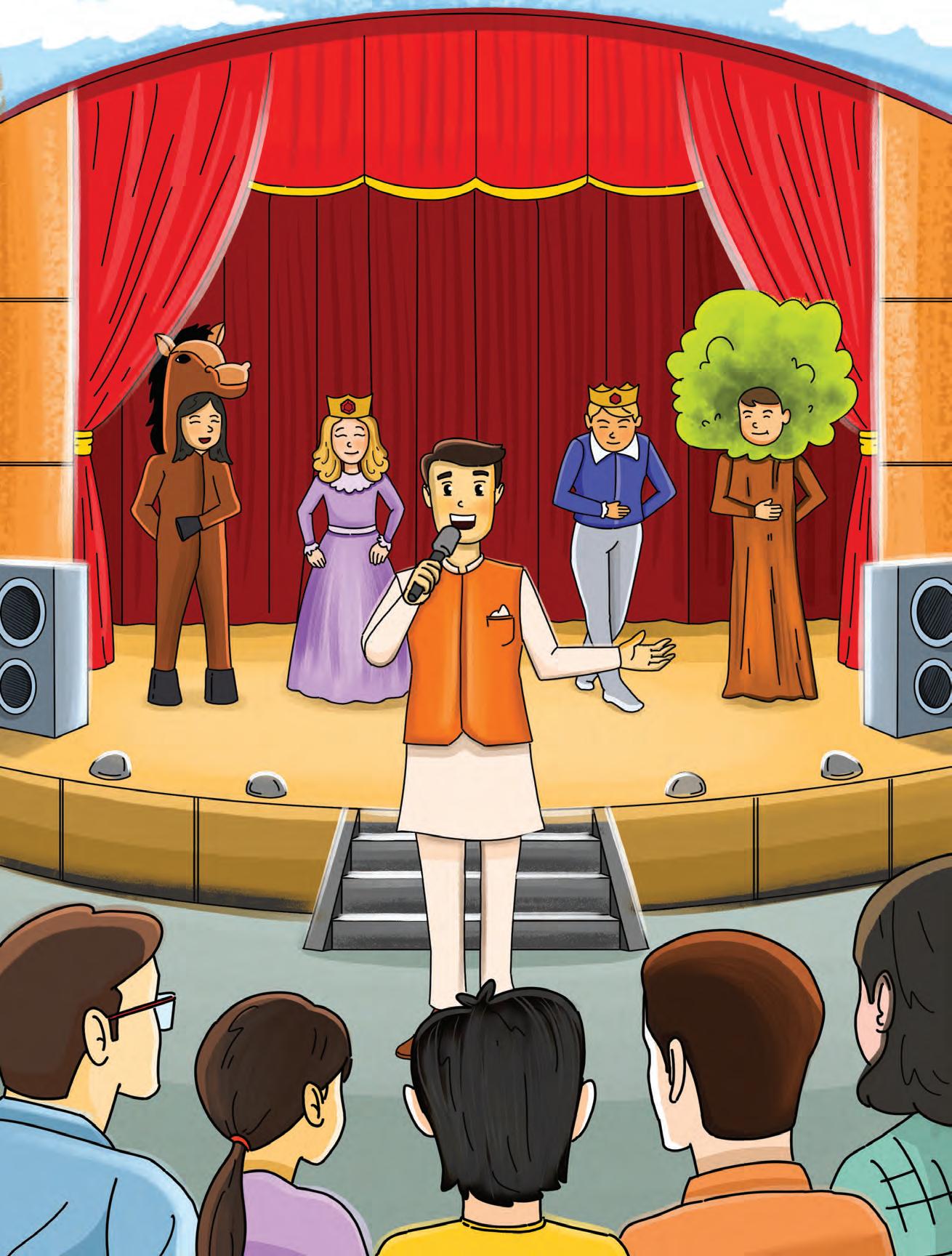
To sum up, I would like to congratulate the team on their hard work.


One of the main highlights...
One of the important facts…

One of the main highlights of the science fair was the robot that could talk./ One of the main highlights of the story was the police who saved the boy.
One of the important facts is that daily exercise significantly improves mood./ One of the important facts for students to remember is the sun is a star.
Most importantly... Most importantly, the event ended on a good note./ Most importantly, the main character learnt the value of friendship.
The... ended with... The story ended with the family coming back together./ The event ended with music and dancing.
The… was mainly about...
The story was mainly about a brave girl who saved her village during a storm./ The science project was mainly about how plants grow in different types of soil.
This shows that… Ravi helped his friend finish the project on time. This shows that he is responsible and caring./ The bird built its nest high up in the tree. This shows that animals know how to keep themselves safe.
To sum it up,… To sum it up, the story teaches us to never give up./ To sum it up, the trip was fun and full of learning.

















In this chapter, I learnt to . New words I learnt:
You celebrated your 10th birthday yesterday and your parents threw a party for you. Write 4–5 sentences to describe the important details of the celebration.
How confident do I feel while giving a short summary with important details? 1 I need help.
I think I can do it. 3 I feel confident.





Hello there! What problem do you see around you today?

There’s plastic waste everywhere. I believe that we should collect and recycle it to make useful things.











Good morning, respected teachers and students!
We are honoured to host today’s event.

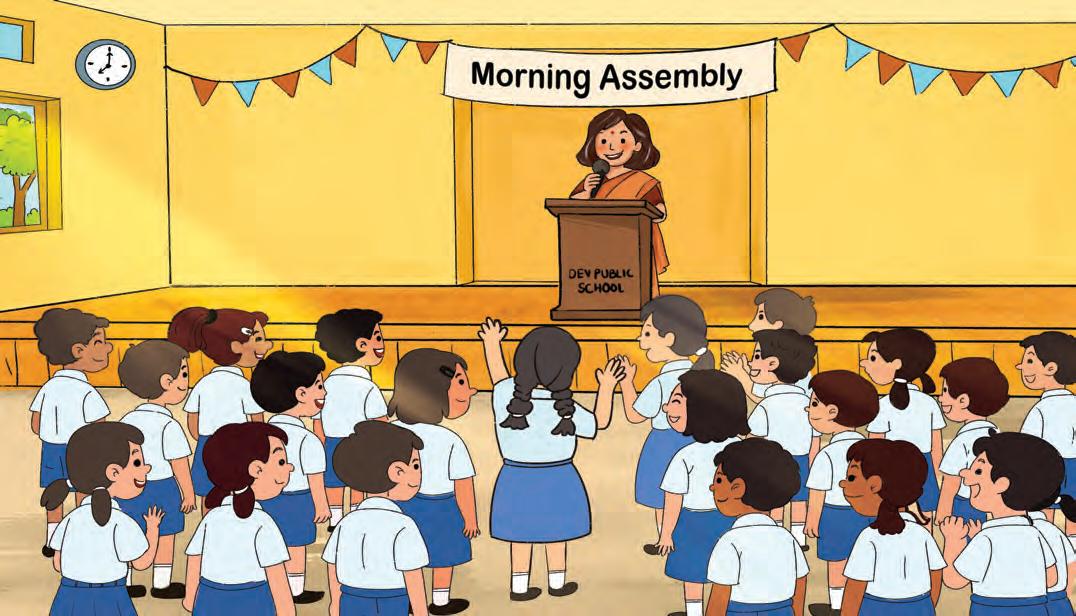



(name of the contact person)


to attend his/her session at 4:00 pm
to ask at the help desk if you have any doubt to interact with the guest to ask our volunteers for help



In this chapter, I learnt to . New words/phrases I learnt: Imagine you are the Junior Head Boy. Write an announcement in 4–5 lines about a drawing competition to be held next week.
How confident do you feel making formal announcements?



I agree with you, but it is slightly expensive.
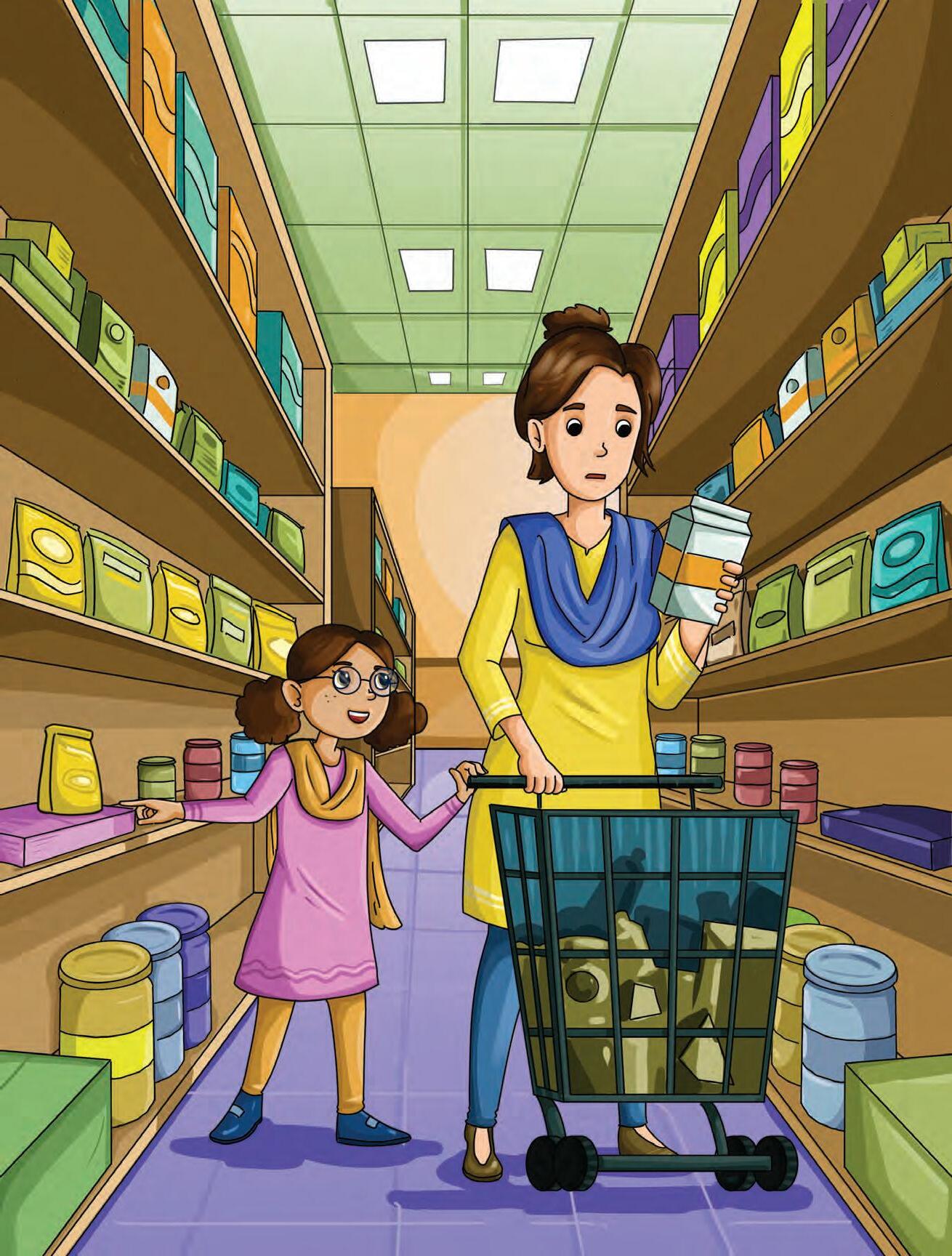
Mother, I think we should buy this. The ingredients are all natural.
















This SPEAK 2.0 book aims to systematically build English language skills in learners and enable them to verbally express themselves in real-world situations. Each chapter focusses on building specific English language competencies and weaves together activities that are research-based, age-appropriate, contextual, experiential and joyful. The activities adhere to the highly recommended and research-based teaching-learning method known as the Gradual Release of Responsibility (GRR), which has been endorsed by the NEP 2020 and the NCF 2022–23. Through the series, learners receive dedicated time and space within the classroom to express themselves in English which helps them in becoming confident speakers of the language.
• Activity-Based Learning: The book offers joyful experiential activities that build English communication competencies.
• Texts per the NEP 2020 Themes: The book has exciting and stimulating texts that pave the way for English communication activities.
• Tech Integration: The book works in sync with our digital component, where various other activities and projects are undertaken. Learner outputs are evaluated through an AI-based speech recognition engine.
• Teachers’ Manual: The book is complemented by the Teachers’ Manual that enables teachers to conduct each session effectively.
Uolo partners with K-12 schools to provide technology-enabled learning programs. We believe that pedagogy and technology must come together to deliver scalable learning experiences that generate measurable outcomes. Uolo is trusted by over 15,000+ schools across India, Southeast Asia and the Middle East.
ISBN 978-93-89057-80-5
